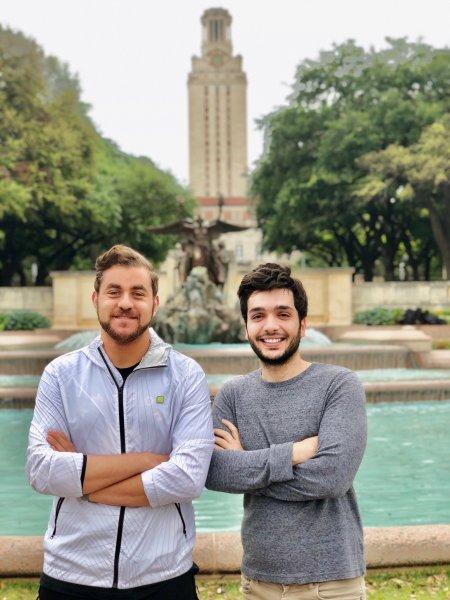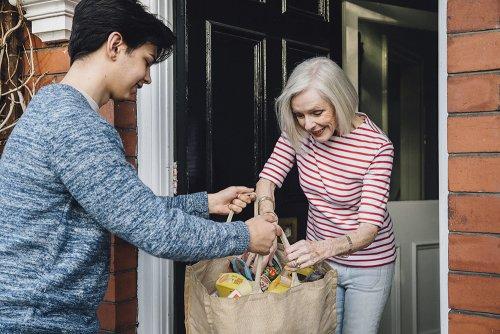
TXCS student Amir Mostafavi (left) and his friend Ali Ajam, the developers of kovid19.org
As the number of COVID-19 infections rises and people remain in isolation, the streets have increasingly begun to look like scenes from doomsday movies. This is in stark contrast to grocery stores and other essential establishments, however, where people continue to congregate out of need for essential supplies. Although many stores have enforced restrictions such as limiting the number of customers allowed inside at a time, they still pose a significant risk. A Centers for Disease Control and Prevention (CDC) advisory explicitly mentions grocery stores as places where social distancing measures become difficult to follow, possibly increasing transmission of the disease. The CDC also recommends that people at higher risk of severe illness, e.g., older adults and individuals with underlying health conditions, absolutely do not leave their homes. This has led to a number of health professionals advising that their at-risk patients have friends and relatives shop for them.
Texas Computer Science (TXCS) senior Amir Mostafavi acutely felt the effects of this a couple of weeks ago. His grandmother, who lives in Dallas, called him and asked if he could buy her groceries. “She didn’t know I was in Austin,” explains Amir. “I had to call one of my friends who was in Dallas to go help her out.” It was this incident that gave him the idea of automating that process. “So that people who need help can sign up, people who are willing to give help can sign up as well, and then we can match them together,” he says.
Amir called his friend Ali Ajam to tell him about his idea, and they immediately got to work. After a day of brainstorming and two more days of developing, they deployed their website, kovid19.org. “It was like a three-day sprint,” laughs Amir. At the moment, the website gives visitors the option to sign up to either offer or request help in any of three categories: grocery shopping, dog walking, and technical help. Visitors can then enter their name, phone number and zip code. “And then on the back end, we match people who are in the same zip code and help category. The matching happens automatically,” says Ali. “Every four hours, we run a function to check all the new data and generate pairs.”

Once a match is made, each person gets a confirmation text with details on how to contact their helper/requestor. “This is a part that's really important to us,” says Amir. “At first our approach was to match these two people and then send them an email with both parties’ contact information. But then we realized that this website is primarily aiming to help elderly people, and most of them don’t have email addresses, so we decided to just do phone numbers.” They took extensive measures to protect the privacy of their users. In Amir’s words: “We didn't want to share any of the parties’ phone numbers with each other for privacy reasons. So we have an intermediary number that all the texts go through, and on the back end, we figure out where to route them based on the pairs that we have. And then these two people can communicate through our phone number as much as they want.”
Users have the freedom to opt out as well. If someone wants to unmatch with a specific person, they can reply “unmatch” to the same phone number. The pair gets broken up, and the people are added back to the matchmaking process. And if someone wants to remove themselves from the system completely, they can reply with “exit,” which takes them out of the matchmaking process and the match that they already have.
At the time that this article was written, kovid19.org had been active for two days and already had around 100 users signed up. “I was checking through some of the zip codes that we have and they're from all over the place— New York, Texas, even Mississippi, Kansas,” says Amir. Ali adds, “But more exciting than that is that 80% of those people signed up to provide help.”
The reactions they’ve received from some of their close friends have been especially heartwarming for the two. “I actually have a senior roommate, and he was so excited when I told him [about it]. People love the idea,” says Ali. “We just need to find a good channel to spread the platform to let people know that it exists. And then hopefully it can be a good use for all of them.”
You can visit kovid19.org to try out the website. For the latest information about campus COVID-19 response measures, please check the University of Texas at Austin’s Coronavirus Updates website.



